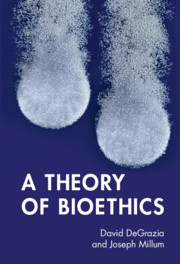This book has covered a lot of ground. We began with the development of our theory of bioethics at a very abstract level. It is an ethical theory that recognizes two fundamental values – well-being and respect for rights-holders – along with a formal principle of equal consideration. At this level, it is easy to state, but it is not immediately obvious how to apply it to problems in bioethics. Much of the book has therefore involved specifying the theory at a level of detail that allows us to apply it to real-world questions. Given that well-being is a fundamental value, we need to know what well-being consists in, what it is to harm and to benefit someone, and who has a welfare that matters morally. Given that respect for rights-holders is a fundamental value, we need to know who has rights, what they are rights to, and so forth. Development and application of the theory go hand-in-hand.
Specifying the theory at a level of detail that allows it to be applied has led to our consideration of a wide range of topics in clinical ethics, research ethics, and health policy. Among others, in clinical ethics, we examined medical assistance-in-dying, proxy decision-making, treatment decisions for impaired newborns, advance directives for dementia patients, and the nature of death. In research ethics, we addressed permissible risk levels in pediatric research, embryonic stem-cell research, and research with rodents and great apes. As for health policy, applications of our theory included explorations of pharmaceutical marketing, access to health care, intellectual property laws, and sex selection.
Beyond these developed applications, there remain many important questions in bioethics that we have not covered. These include questions relating to the role morality of clinicians, medicalization and the classification of disease, race and racism in medicine, numerous issues concerning the design of clinical trials and the provision of benefits to research participants and communities, how public health systems should allocate scarce resources for care and research, and the proper scope of health care. Nor is this list exhaustive, as a glance at the table of contents of any of the many bioethics journals will show.
Our coverage of issues in contemporary bioethics is incomplete. Moreover, our conclusions regarding the issues that we do cover are often controversial: we do not attempt to represent a consensus view. What, then, one might ask, should a reader make of all this theorizing?
Our goal is neither to be complete nor to have the final word. It is more modest than that. We aim for sufficient clarity in the presentation of our theory and how we developed it that it can help readers in their own thinking about bioethics. Where they disagree, we hope that it will be clear where the disagreement lies and what underlies it. That recognition will help them to develop their views on the basis of rigorous, well-informed argumentation. Where they find the theory plausible, we hope that it will be clear how to apply it to the specific questions in bioethics that the reader finds pressing and unresolved. That may illuminate those questions. Our theory of bioethics is a tool whose value will depend on how it is used.

